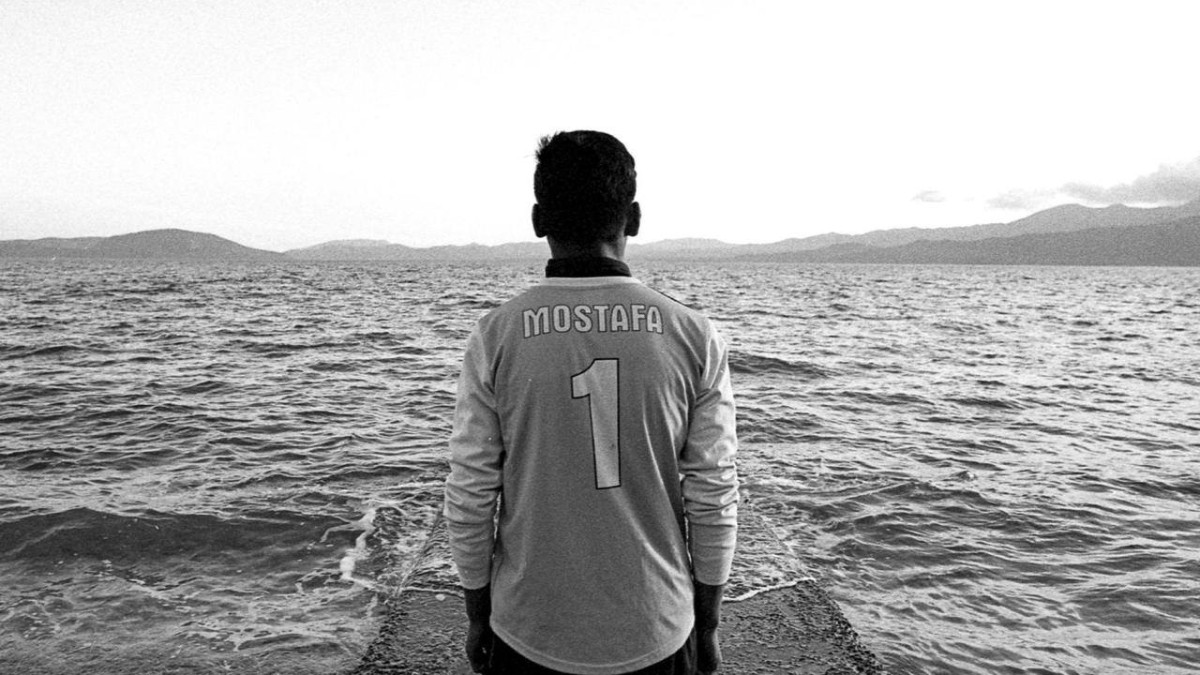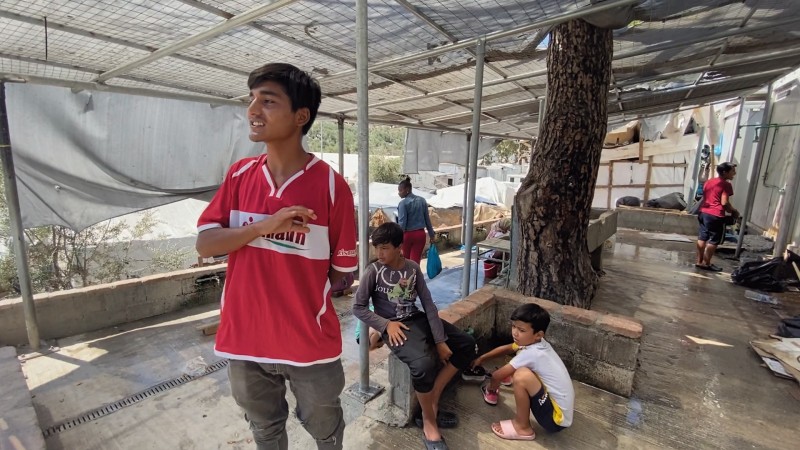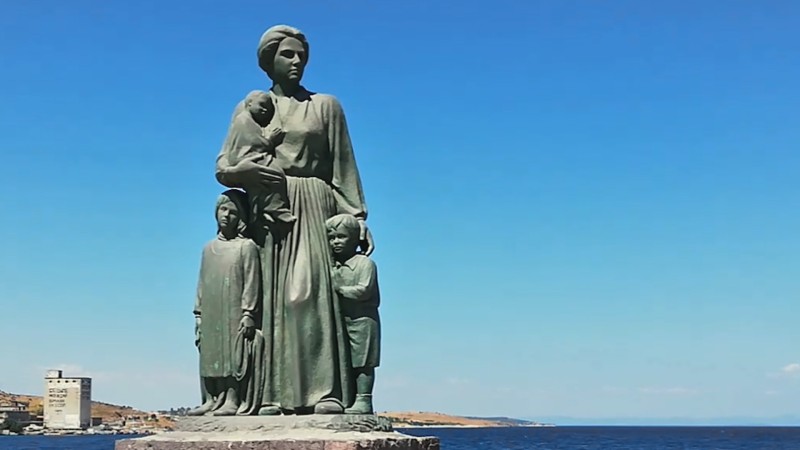Grüne Bildungswerkstatt : IN MEMORIAM

In der Nacht auf den 9. September 2020 geht das Flüchtlingslager Moria auf Lesbos in Flammen
auf. Mitten in den dramatischen Ereignissen vor und nach dem Brand entwickelt sich eine Freundschaft zwischen einem Geflüchteten
aus Afghanistan und einer ehrenamtlichen Helferin aus Österreich. Anschließende Diskussion mit Ewa Ernst-Dziedzic (Abgeordnete
zum Nationalrat und Sprecherin für Außenpolitik, Migration, Menschenrechte und LGBTI), Elisabeth Pointner (Filmemacherin),
Doro Blancke (Menschenrechtsaktivistin), Ariane Umathum (Verein Region Neusiedlersee hilft)
Veranstaltung der Grünen Bildungswerkstatt Wien in Kooperation mit Ewa Ernst-Dziedzic
On the night of September 9, 2020, the Mória refugee camp on the Greek island
Lesvos bursts into flames. Amidst the dramatic events before and after this disaster, a friendship develops between a young
refugee from Afghanistan and a volunteer helper from Austria.
SYNOPSIS
Mória, summer 2020. It is hot between the tents, even hotter in the tents. The residents of the hopelessly overcrowded camp are suffering from inadequate sanitary infrastructures, the latent danger of the coronavirus, the associated exit restrictions and lockdowns, internal tensions and acts of violence in the camp. In addition, the inhabitants are confronted with fascist attacks from outside, as well as overburdened Greek authorities and a lack of willingness on the part of the European Union to solve this humanitarian catastrophe on a political level. The camp is becoming a powder keg where families, pregnant women, children, unaccompanied minors and single men of diverse backgrounds are forced to live together under the most adverse circumstances, condemned to wait in uncertainty. The tensions ultimately erupt in a catastrophic fire on the night of 9 September 2020.In the midst of all this, IN MEMORIAM tells of a developing friendship between a volunteer from Austria and a young refugee from Afghanistan who has not yet lost his hope for a better future.
Over a period of five months, the film shows the continuously worsening humanitarian catastrophe on Lesvos. The everyday life, worries and problems of the people stranded in the camp are captured in intense and oppressive images of Elisabeth‘s and Ali‘s smartphone cameras. We see how the few belongings of the people fall victim to the flames and how the hastily and provisionally rebuilt tents of the Kara Tepe camp – initially promising an improvement for the situation of the refugees – once again fail to provide adequate protection against rain, the cold, floods and storms.
IN MEMORIAM can best be understood as a found footage documentary, compiled of unique material from Elisabeth‘s and Ali‘s smartphone cameras. They were filming with no intention in mind to create a full feature documentary out of their shots. In this way the film reveals previously unseen impressions and viewpoints on the dramatic events in Mória and Kara Tepe. The political appeal and moral unease are not directly inscribed in the images. Instead, in the tradition of direct cinema, the film opens a space for the audience to form their own thoughts and opinions about what is shown and said, while they participate directly in the events in an unexpectedly personal way - first through Elisabeth‘s, then through Ali‘s camera. IN MEMORIAM is a haunting contemporary witness to a European political failure and a human drama, that refrains from using common narratives or imperatives. We accompany Elisabeth and Ali and thus become witnesses to contemporary images of a reality that should not actually exist.
SYNOPSIS
Mória, summer 2020. It is hot between the tents, even hotter in the tents. The residents of the hopelessly overcrowded camp are suffering from inadequate sanitary infrastructures, the latent danger of the coronavirus, the associated exit restrictions and lockdowns, internal tensions and acts of violence in the camp. In addition, the inhabitants are confronted with fascist attacks from outside, as well as overburdened Greek authorities and a lack of willingness on the part of the European Union to solve this humanitarian catastrophe on a political level. The camp is becoming a powder keg where families, pregnant women, children, unaccompanied minors and single men of diverse backgrounds are forced to live together under the most adverse circumstances, condemned to wait in uncertainty. The tensions ultimately erupt in a catastrophic fire on the night of 9 September 2020.In the midst of all this, IN MEMORIAM tells of a developing friendship between a volunteer from Austria and a young refugee from Afghanistan who has not yet lost his hope for a better future.
Over a period of five months, the film shows the continuously worsening humanitarian catastrophe on Lesvos. The everyday life, worries and problems of the people stranded in the camp are captured in intense and oppressive images of Elisabeth‘s and Ali‘s smartphone cameras. We see how the few belongings of the people fall victim to the flames and how the hastily and provisionally rebuilt tents of the Kara Tepe camp – initially promising an improvement for the situation of the refugees – once again fail to provide adequate protection against rain, the cold, floods and storms.
IN MEMORIAM can best be understood as a found footage documentary, compiled of unique material from Elisabeth‘s and Ali‘s smartphone cameras. They were filming with no intention in mind to create a full feature documentary out of their shots. In this way the film reveals previously unseen impressions and viewpoints on the dramatic events in Mória and Kara Tepe. The political appeal and moral unease are not directly inscribed in the images. Instead, in the tradition of direct cinema, the film opens a space for the audience to form their own thoughts and opinions about what is shown and said, while they participate directly in the events in an unexpectedly personal way - first through Elisabeth‘s, then through Ali‘s camera. IN MEMORIAM is a haunting contemporary witness to a European political failure and a human drama, that refrains from using common narratives or imperatives. We accompany Elisabeth and Ali and thus become witnesses to contemporary images of a reality that should not actually exist.








